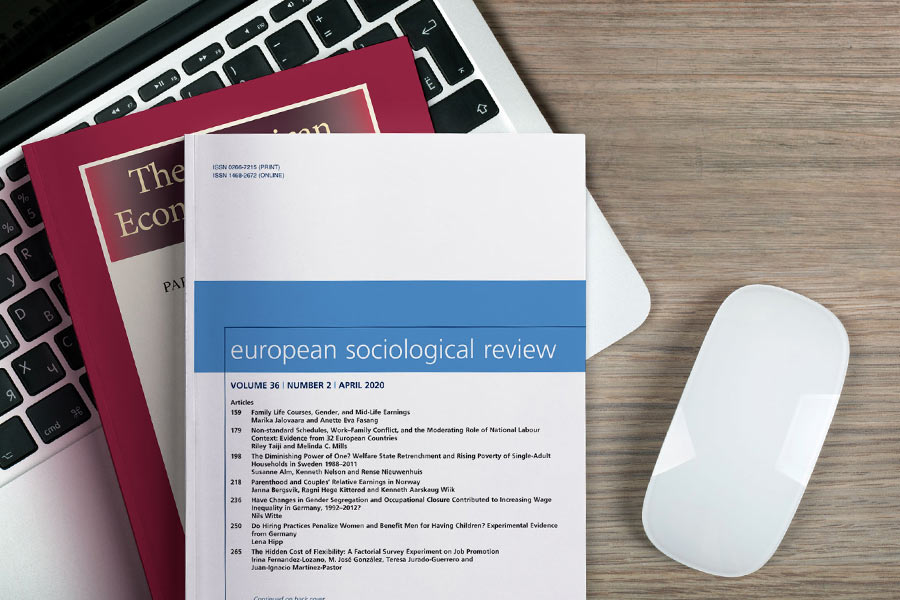Total hits 17.327
-
Flexible Ruhestandgrenze und Arbeitsmarkt. Auswirkungen von Aenderungen der Ruhestandgrenze auf die Zahl der Arbeitskraefte
Greger, M. (1971): Flexible Ruhestandgrenze und Arbeitsmarkt. Auswirkungen von Aenderungen der Ruhestandgrenze auf die Zahl der Arbeitskraefte. In: Materialien aus der Arbeitsmarkt- und Berufsforschung, Vol. 2, No. S2, p. 1-4.
-
Einstellungsbedarf bis 1980.
Klauder, W. & Thon, M. (1971): Einstellungsbedarf bis 1980. In: Materialien aus der Arbeitsmarkt- und Berufsforschung, Vol. 2, No. 35, p. 1-9.
-
Erzieher (Kindergaertnerinnen, Hortnerinnen), Kinderpflegerinnen. Berufsentwicklung nach den Volks- und Berufszaehlungen 1950 und 1961 und weiteren statistischen Unterlagen
Chaberny, A. & Heinz, H. (1971): Erzieher (Kindergaertnerinnen, Hortnerinnen), Kinderpflegerinnen. Berufsentwicklung nach den Volks- und Berufszaehlungen 1950 und 1961 und weiteren statistischen Unterlagen. In: Materialien aus der Arbeitsmarkt- und Berufsforschung, Vol. 2, No. 16, p. 1-6.
-
Die Fotografen. Berufsentwicklung nach den Volks- und Berufszaehlungen 1950 und 1961 und weiteren statistischen Unterlagen
Gottwald, K., Heinz, H. & Otto, M. (1971): Die Fotografen. Berufsentwicklung nach den Volks- und Berufszaehlungen 1950 und 1961 und weiteren statistischen Unterlagen. In: Materialien aus der Arbeitsmarkt- und Berufsforschung, Vol. 2, No. 21, p. 1-8.
-
Erwerbstaetige Frauen nach Berufen und Ausbildungsarten. Zur Struktur der Frauenerwerbstaetigkeit in der Bundesrepublik Deutschland nach Berufen und ihre Veraenderungen nach den Ergebnissen der Berufszaehlungen von 1950 und 1961. Ausbildungsstand der Frauen fuer die ausgeuebte Taetigkeit nach den Ergebnissen des Mikrozensus 1964
Stooss, F. (1971): Erwerbstaetige Frauen nach Berufen und Ausbildungsarten. Zur Struktur der Frauenerwerbstaetigkeit in der Bundesrepublik Deutschland nach Berufen und ihre Veraenderungen nach den Ergebnissen der Berufszaehlungen von 1950 und 1961. Ausbildungsstand der Frauen fuer die ausgeuebte Taetigkeit nach den Ergebnissen des Mikrozensus 1964. In: Materialien aus der Arbeitsmarkt- und Berufsforschung, Vol. 2, No. 23, p. 1-7.
-
Kraftfahrzeugfuehrer, (Berufs-)Kraftfahrer. Berufsentwicklung nach den Volks- und Berufszaehlungen 1950 und 1961 und weiteren statistischen Unterlagen
Heinz, H. & Stooss, F. (1971): Kraftfahrzeugfuehrer, (Berufs-)Kraftfahrer. Berufsentwicklung nach den Volks- und Berufszaehlungen 1950 und 1961 und weiteren statistischen Unterlagen. In: Materialien aus der Arbeitsmarkt- und Berufsforschung, Vol. 2, No. 15, p. 1-6.
-
Auswirkungen technischer Änderungen. Teil 1: Begründung, Zielsetzung und Methoden der repräsentativen Erhebung des IAB (Projekt 5-44) über die Auswirkungen technischer Änderungen auf Arbeitskräfte und Arbeitsplätze
Lahner, M. (1971): Auswirkungen technischer Änderungen. Teil 1: Begründung, Zielsetzung und Methoden der repräsentativen Erhebung des IAB (Projekt 5-44) über die Auswirkungen technischer Änderungen auf Arbeitskräfte und Arbeitsplätze. In: Materialien aus der Arbeitsmarkt- und Berufsforschung, Vol. 2, No. 34, p. 1-7.
-
Die Fotolaborantin. Berufsentwicklung nach den Volks- und Berufszählungen 1950 und 1961 und weiteren statistischen Unterlagen
Gottwald, K., Heinz, H. & Otto, M. (1971): Die Fotolaborantin. Berufsentwicklung nach den Volks- und Berufszählungen 1950 und 1961 und weiteren statistischen Unterlagen. In: Materialien aus der Arbeitsmarkt- und Berufsforschung, Vol. 2, No. 25, p. 1-4.
-
Die Koeche. Berufsentwicklungen nach den Volks- und Berufszaehlungen 1950 und 1961 und weiteren statistischen Unterlagen
Heinz, H. & Otto, M. (1971): Die Koeche. Berufsentwicklungen nach den Volks- und Berufszaehlungen 1950 und 1961 und weiteren statistischen Unterlagen. In: Materialien aus der Arbeitsmarkt- und Berufsforschung, Vol. 2, No. 26, p. 1-9.
-
Berufliche Fortbildung, Umschulung und Einarbeitung. Ein Beitrag zur Erforschung beruflicher Erwachsenenbildung als Gegenstand oeffentlicher Beschaeftigungspolitik in der Bundesrepublik Deutschland
Brinkmann, C. (1971): Berufliche Fortbildung, Umschulung und Einarbeitung. Ein Beitrag zur Erforschung beruflicher Erwachsenenbildung als Gegenstand oeffentlicher Beschaeftigungspolitik in der Bundesrepublik Deutschland. In: Materialien aus der Arbeitsmarkt- und Berufsforschung, Vol. 2, No. 17, p. 1-7.
-
Zur Transformation von Forschungsergebnissen
Mertens, D. (1971): Zur Transformation von Forschungsergebnissen. In: Mitteilungen aus der Arbeitsmarkt- und Berufsforschung, Vol. 4, No. 4, p. 353-355.
-
Zur Saisonbereinigung der Statistiken der Arbeitslosen und der Offenen Stellen
Karr, W. & Schulze, H. (1971): Zur Saisonbereinigung der Statistiken der Arbeitslosen und der Offenen Stellen. In: Materialien aus der Arbeitsmarkt- und Berufsforschung, Vol. 2, No. 30, p. 1-7.
-
Der Apotheker. Berufsentwicklung nach den Volks- und Berufszaehlungen 1950 und 1961 und weiteren statistischen Unterlagen
Parmentier, K. (1971): Der Apotheker. Berufsentwicklung nach den Volks- und Berufszaehlungen 1950 und 1961 und weiteren statistischen Unterlagen. In: Materialien aus der Arbeitsmarkt- und Berufsforschung, Vol. 2, No. 27, p. 1-11.
-
Die Weinkuefer. Berufsentwicklung nach den Volks- und Berufszaehlungen 1950 und 1961 und weiteren statistischen Unterlagen
Heinz, H., Kaiser, M. & Otto, M. (1971): Die Weinkuefer. Berufsentwicklung nach den Volks- und Berufszaehlungen 1950 und 1961 und weiteren statistischen Unterlagen. In: Materialien aus der Arbeitsmarkt- und Berufsforschung, Vol. 2, No. 29, p. 1-8.
-
Neue Messverfahren der Berufsforschung. Der Wirtschaftszweigeffekt und der Arbeitsplatzbesetzungseffekt als zwei neue Moeglichkeiten, Wachstum und Schrumpfung von Berufen zu messen
Stooss, F. (1971): Neue Messverfahren der Berufsforschung. Der Wirtschaftszweigeffekt und der Arbeitsplatzbesetzungseffekt als zwei neue Moeglichkeiten, Wachstum und Schrumpfung von Berufen zu messen. In: Materialien aus der Arbeitsmarkt- und Berufsforschung, Vol. 2, No. 28, p. 1-7.
-
Wissenschaft und Praxis - Moeglichkeiten ihres Verhaeltnisses zueinander
Bolte, K. (1971): Wissenschaft und Praxis - Moeglichkeiten ihres Verhaeltnisses zueinander. In: Mitteilungen aus der Arbeitsmarkt- und Berufsforschung, Vol. 4, No. 4, p. 356-365.
-
Die Brauberufe (Brauer und Maelzer, Diplom-Braumeister, Brauingenieure, Diplom-Ingenieure Fachrichtung Brauwesen) Berufsentwicklung nach den Volks- und Berufszaehlungen 1950 und 1961 und weiteren statistischen Unterlagen
Heinz, H., Kaiser, M. & Otto, M. (1971): Die Brauberufe (Brauer und Maelzer, Diplom-Braumeister, Brauingenieure, Diplom-Ingenieure Fachrichtung Brauwesen) Berufsentwicklung nach den Volks- und Berufszaehlungen 1950 und 1961 und weiteren statistischen Unterlagen. In: Materialien aus der Arbeitsmarkt- und Berufsforschung, Vol. 2, No. 24, p. 1-10.
-
Der Arzt. Berufsentwicklung nach den Volks- und Berufszählungen 1950 und 1961 und weiteren statistischen Unterlagen
Parmentier, K. (1971): Der Arzt. Berufsentwicklung nach den Volks- und Berufszählungen 1950 und 1961 und weiteren statistischen Unterlagen. In: Materialien aus der Arbeitsmarkt- und Berufsforschung, Vol. 2, No. 22, p. 1-12.
-
Die berufliche Ausbildung der Erwerbstaetigen in der Bundesrepublik Deutschland. Ergebnisse der Mikrozensus-Zusatzbefragung des Statistischen Bundesamtes vom April 1964 zum Stand der beruflichen Ausbildung nach Altersgruppen
Stooss, F. (1971): Die berufliche Ausbildung der Erwerbstaetigen in der Bundesrepublik Deutschland. Ergebnisse der Mikrozensus-Zusatzbefragung des Statistischen Bundesamtes vom April 1964 zum Stand der beruflichen Ausbildung nach Altersgruppen. In: Materialien aus der Arbeitsmarkt- und Berufsforschung, Vol. 2, No. 18, p. 1-6.
-
Der Tierarzt. Berufszaehlungen nach den Volks- und Berufszaehlungen 1950 und 1961 und weiteren statistischen Unterlagen
Parmentier, K. (1971): Der Tierarzt. Berufszaehlungen nach den Volks- und Berufszaehlungen 1950 und 1961 und weiteren statistischen Unterlagen. In: Materialien aus der Arbeitsmarkt- und Berufsforschung, Vol. 2, No. 10, p. 1-8.



